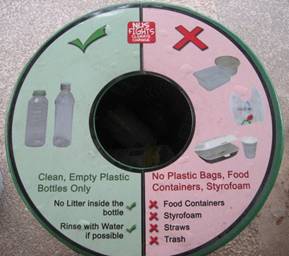Reader Jason Bade writes in with a comment about the power of labels on decision making about recycling.
Oftentimes, we are given two options when it comes to disposing of our refuse: “Recycle” and “Trash.” When one approaches a recycling receptacle, one is confronted by a set of rules that are rather easy to break, even if by accident (for example, I can recycle a plastic milk bottle, but not a plastic soap bottle). Because we, as humans, are lazy, we tend toward the option that carries with it no burden of rules–no risk of being wrong. There are no rules to throwing stuff in the trash, so it is the naturally appealing option. How, then, can we change this choice architecture to eliminate (or at least equalize) the risk of each option?
The reason this situation exists in the first place is that these choices are not mutually exclusive. In theory, aluminum can could be put in either receptacle without breaking any “rules.” Although I am unsure of this empirically, I would venture that a change in garbage can lingo could increase recycling rates, if it were more specific and put the choice in absolute terms. Take the label “trash,” or “garbage,” which implies “everything we don’t want.” If we relabeled garbage cans as “Non-Recyclables” (or the trash cans next to compost bins as “Non-Compostables”), it might make people think a lot harder about what to put in which bins. Recycling bins could still be labeled “Recyclables” but trash bins might also be labeled “Non-Recyclables.” This not only would give every single discardable item only one legitimate destination, but it would also put the decision to recycle on par with throwing it away.
Addendum: Jason is an undergraduate at Stanford who is starting a group called BEAST–-Behavioral Economists at Stanford. BEAST’s purpose, he writes, is “to investigate behavioral problems, implement controlled `nudge’ experiments around campus and in the greater community to remedy them, and then publish the results online and in the greater community for implementation elsewhere.” The group isn’t up and running yet, but if you’re at Stanford and interested in nudging, try and check it out.


